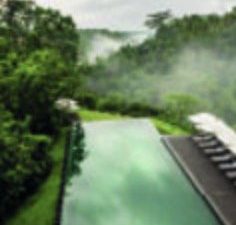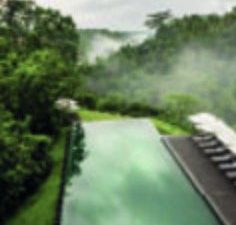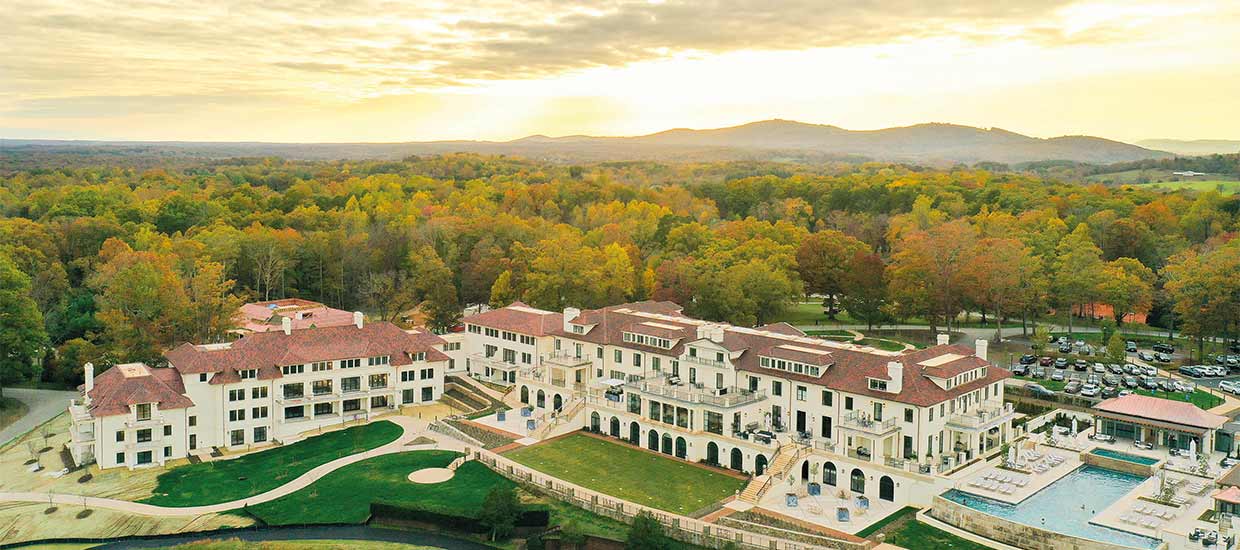Escape to Bali
September 29, 2017


In Ubud’s Sacred Monkey Forest, there are signs warning people not to touch, feed or make eye contact with the animals, but no one takes any notice. There are bananas for sale and staffers hand out fistfuls of peanuts to tourists.
It doesn’t take much to attract the monkeys – I see one tear open a shopping bag, and another peel fruit while sitting on a gleeful child’s shoulder. The mischievous primates especially like glittery earrings – on the stone steps of an amphitheatre, one leaps on to a woman and snatches at her jeweled lobe, making her scream, before running off with his prize.
Tentatively making our way through the jungle, keeping an eye on the squabbling macaques in the trees, we pass ancient, moss-covered temples, statues of grinning apes, and ornate winged dragons guarding a stone bridge high above a ravine. Officially a nature reserve (open daily 8:30 AM – 6:00 PM), its 700 or so monkeys are fed on sweet potato three times a day, but this doesn’t suppress their appetite for mischief.
While I pose for a photo, a juvenile springs from nowhere and grabs my face, leaving two neat sets of scratches (albeit faint) across my temples. I spend the next hour googling: “Can you catch rabies from a monkey scratch?” (the answer is yes so I am freaking out) and ordering bottles of Bintang beer from the nearby Habitat Café, which has free WiFi (habitatubud.com).
Next door is hipster co-working space Hubud (hubud.org). The bamboo house has an organic café where flip-flopped writers sit with laptops looking out on to paddy fields, and eager entrepreneurs spend hours coding while drinking kombucha (fermented tea). This summer, Hubud will host a Google-sponsored Startup Weekend for tourism and hospitality ventures.
Growing Numbers
Last year, almost five million people visited Bali, a 23 percent increase from 2015. Joining high-end international brands such as Aman, Four Seasons, W, Anantara and Oberoi have been two hotels from Ritz-Carlton (the Mandapa, a Reserve property, and the Ritz-Carlton Bali, opened in 2015), the Hoshinoya (January 2017) and the Capella Ubud, which will feature 22 luxury tents when it launches at the end of the year.
Asian chain Alila has four properties on the 2,200-square-mile island of Bali – the Seminyak, Manggis, Uluwatu and Ubud, where I am staying. The resort is about 20 minutes’ drive from the town of Ubud itself, popular over the years with hippies and backpackers.
Along the sides of the streets, which are strewn with tiny trays of flowers and rice as offerings to the gods, are shops selling phallic bottle openers, knock-off Ray-Bans and leering masks. In the evening we stop at Hujan (hujanlocale.com), a stylish cocktail bar and restaurant that also does cooking classes. Opposite is Fair Warung Bale, a simple set-up serving delicious food in generous quantities. All of its profits go toward providing free healthcare for locals.
While Ubud is fun for a day, the main draw for me is escaping to the steamy climes of the Alila Ubud, set high above the tree canopy, with a jade infinity pool that offers a staggering panorama of the misty, verdant valley. (If you’re after sun, bear in mind that the dry season is between April and September.)
Peaceful Easy Feeling
Apart from the squawk of monkeys and birds, the resort is wonderfully peaceful, days beginning with a traditional breakfast on the terrace – chilled watermelon and red chili juice, and a bowl of nasi goreng ayam (fried rice with chicken, a fried egg and pickles). While standard rooms are comfortable (the outdoor rainshowers are the highlight), the palapa-roofed villas with private pools are very special.
If you are staying for more than a couple of days, you may be tempted to book one of the excursions that the Alila organizes, such as quad biking, VW jungle safaris or morning bird watching. You can even hike to the summit of active volcano Mount Batur. The on-site spa specializes in traditional massages to leave even the most stressed-out business traveler feeling reborn after meetings in hectic Jakarta, just under two hours’ flight away.
We take the hotel shuttle 34 miles to the Alila Uluwatu, perched on cliffs at the southerly tip of the island (only 35 minutes from the international airport). The focal point of the minimalist, all-villa resort is the enormous pool and gravity-defying cantilevered Sunset Cabana bar, although guests also have the pleasure of their own personal plunge pools and hyper-modern residences, accessed by golf cart.
Apart from a perilous hike down hundreds of narrow steps to the beach, there is nothing to distract you from relaxing. During the day, staff members set down poolside hampers of iced water, menus and sunscreen (although I’d advise you to use your own SPF 30 as the ozone layer is thin in these parts). In your personal 3,100-square-foot villa, you can lounge on a day bed and have a butler wait on you around the clock.
In contrast to more rustic eating in Ubud, the Uluwatu opts for fine dining. Alone in concept restaurant Quila, we embark on a ten-course “sensory journey” that starts with us being blindfolded while eating a cube of rock lobster covered in green foam, then consuming a mushroom meringue enclouded in dry ice. By now, I can safely say that my traumatic experience in the monkey forest feels far behind me.
A two-night weekend stay at the Alila Ubud starts from $370 for a Superior room in July. The Alila Uluwatu starts from $884 for a one-bedroom villa.
Visit alilahotels.com, destination-asia.com, garuda-indonesia.com
By Jenny Southan




